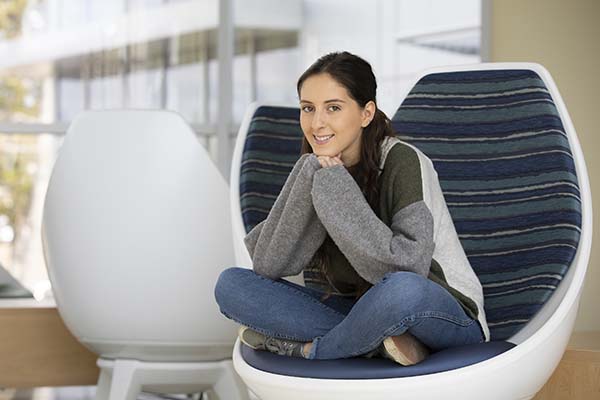Polymers could reduce harm caused by landfills

A Binghamton University undergraduate researcher hopes to reduce the impact of landfills on the environment.
Eleonora Recio, a junior majoring in mechanical engineering with a minor in sustainability, focused on leachate runoff as part of the Summer Scholars and Artists program.
Leachate, water that has soaked through material and picked up particles in the process, is common in landfills. After it rains, water passes through garbage and absorbs chemicals, becoming toxic to the environment.
Recio tested the effects of different super-absorbent polymers on leachate. These everyday materials can absorb several times their own weight, and Recio saw an opportunity to combine her love for the environment and her passion for mechanical engineering.
Recio examined four different polymers to see how well they absorbed distilled water, tap water and leachate collected from the Broome County Landfill. A powder form of the polymer was mixed with the leachate and poured through a sieve, filtered through a vacuum, dipped in the leachate through a teabag or tested via the absorbency under load (AUL) method. The AUL method tested to see how much the polymer could absorb when under pressure.
After the tests, the samples were dried and weighed to measure how much leachate was absorbed. AUL provided the best results and most accurately mimicked the landfill environment.
“Science is a slow-moving process, but it has to be,” Recio says. “You really want to be as accurate as possible.”
Congrui Jin, assistant professor of mechanical engineering, advised Recio on the project. Recio originally approached her mentor when she was just a sophomore.
“It was the first time I’ve had a student who just finished [their] second year,” Jin says. “She was very reliable, and she scheduled her tasks so she could finish by the end [of the summer]. I think she’s very motivated, and we want to have younger students in our labs.”
Recio says applying to conduct research so early in her undergraduate career forced her to work better under pressure and taught her how to learn in a fast-paced environment.
Outside of the lab, the Long Island native is a member of Alpha Omega Epsilon, a social and professional sorority for women in engineering and the technical sciences. She also serves as secretary for the Society of Hispanic Technical Engineers and works at Information Technology Services on campus.
Recio said the sorority has been a crucial pillar of her support system. “It’s been a huge help to have so much female support around me at all times,” she says. “I go to my classes and it’s 85% guys so it’s really nice to see a familiar face.”
Through her older classmates, she saw a glimpse of what could be next in her academic career.
Recio said she also hopes further research can test biodegradable varieties of polymers to further promote sustainability, which has also become her minor. She plans to attend graduate school and continue doing research.
“Sustainability is very important,” she says. “You may not be in a science-related field, but that doesn’t mean there’s nothing you can do about it, whether it’s in your professional life … or using your voice if you’re in a position of power.”

